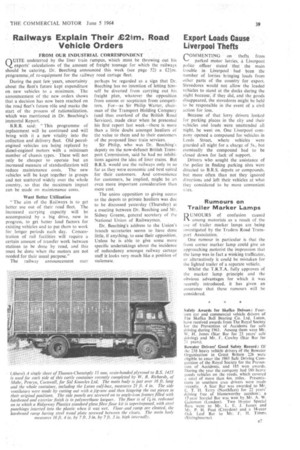Railways Explain Their M2 - 4 - m. Road Vehicle Orders FROM OUR INDUSTRIAL CORRESPONDENT .
Page 41

If you've noticed an error in this article please click here to report it so we can fix it.
nUATE undeterred by the liner train rumpus, which must be throwing out his experts' calculations of the amount of freight. tonnage for which the railways should be catering, Dr. Beeching announced this week (set page 52) a 1:14,m. programme„,of re-equipment for the railway road cartage fleet During the past few years, uncertainty about the fleet's future kept expenditure on new vehicles to a minimum. The announcement of the new orders shows that a decision has now been reached on the road fleet's future role anti marks the start of the process of rationalization, which was mentioned in Dr. Beecbing's immortal Report.
B.R.B. said " This programme of replacement will be continued and will bring with it a new vitality into the collection arid delivery fleet. Old petrolengined vehicles are being replaced by diesel-engined motors with a minimum number of chassis types.These will not only be cheaper to operate but an increased measure of standardization will reduce maintenance costs. The new vehicles will be kept together in groups and not scattered widely over the whole country, so that the maximum impact can be made on maintenance costs.
Want Better Utilization "The aim of the Railways is to get better use out of their road fleet. The increased carrying capacity will be accompanied by a big drive, now in progress, to get better load factors for existing vehicles and to put-them to work for longer periods each day. Concentration of rail facilities will require a certain amount of transfer work between stations to be done by road, and this must be done when the motors are not needed for their usual purpose."
The railway announcement may
perhaps be regarded as a sign that Dr. Beeching has no intention of letting himself be diverted from carrying out his freight plan, whatever the opposition from unions or scepticism from competitors. For----as Sir Philip Warter, chairman of the Transport Holding Cornpany (and thus overlord of the British Road Services), made clear when he presented his first report last week—there is more than a little doubt amongst hauliers of the value to them and to their customers of the proposed liner train services.
Sir Philip, who was Dr. Beechine's deputy on the now-defunct British Transport Commission, said he had no inhibitions against the idea of liner trains. But B.R.S. would use the railways only in so far as they were economic and best suited for their customers. And convenience for customers, he implied, might be an even more important consideration than mere cost.
The union opposition to giving access to the depots to private hauliers was due to be discussed yesterday (Thursday) at a meeting between Dr. Beeching and Mr. Sidney Greene, general secretary of the National Union of Railwaymen.
Dr. Beeching's address to the Union's branch secretaries seems to have done little, if anything, to ease their opposition. Unless he is able to give some more specific undertakings about the incidence of redundancy amongst railway cartage staff it looks very much like a position of stalemate,












































































































































































